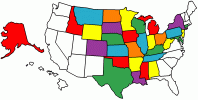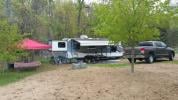 |
 09-06-2018, 03:05 PM
09-06-2018, 03:05 PM
|
#1
|
|
Member
Join Date: Jul 2018
Location: OKLAHOMA CITY
Posts: 51
|
Propane Tank "blanket" or Pad
Those of you who have used your rigs in the winter time and used propane did you have any issues with the tanks freezing up when you were consuming propane ?
Would a tank blanket or even a water holding tank heating pad work to keep the propane tanks more elevated in temperature ? Assuming you could power them from 12v so you could use shore or battery.
|

|

|
 09-06-2018, 03:20 PM
09-06-2018, 03:20 PM
|
#2
|
|
Senior Member
Join Date: Apr 2015
Location: Michigan
Posts: 2,650
|
Never heard of a tank freezing, maybe a regulator due to moisture. Propane tanks will freeze up when the ambient temperature drops below -44°F.
|

|

|
 09-06-2018, 03:37 PM
09-06-2018, 03:37 PM
|
#3
|
|
Member
Join Date: Jul 2018
Location: OKLAHOMA CITY
Posts: 51
|
I was more concerned with the temperature drop of the propane tank below 32degF and lowered efficiency of said tank and propane. Propane is more efficient if its not cold.
|

|

|
 09-06-2018, 03:39 PM
09-06-2018, 03:39 PM
|
#4
|
|
Senior Member
Join Date: Sep 2016
Location: Burleson
Posts: 537
|
I've been camping in single digits and my heater has always been good.
Does it use more at that temp? No idea.
|

|

|
 09-06-2018, 04:01 PM
09-06-2018, 04:01 PM
|
#5
|
|
Senior Member
Join Date: Aug 2017
Location: Rock Island
Posts: 1,073
|
I had our motor home in -20 for a week and never had any problems. The tank was completely exposed on the bottom (not in a compartment)
__________________
2017 Eagle 291RSTS
2017 Chevy Silverado Duramax 2500
|

|

|
 09-06-2018, 04:05 PM
09-06-2018, 04:05 PM
|
#6
|
|
Senior Member
Join Date: Oct 2017
Location: Calgary
Posts: 458
|
Unless you are on shore power, I'd say any kind of heating device will cause more problems with the batteries than it will solve with the propane.
I do know propane vaporizes more slowly at very cold temps, so you could get fewer BTU/h out of your lines, and that could cause issues with appliances. Hasn't been an issue for me, but I camp above freezing.
|

|

|
 09-06-2018, 06:10 PM
09-06-2018, 06:10 PM
|
#7
|
|
Senior Member
Join Date: Jun 2013
Location: McKean, PA
Posts: 1,073
|
Propane pressure changesl
The pressure of the gas in you tank will change as the temperature drops. The chart below shows the tank pressure at various temperatures. I've had small propane tanks freeze up when heavily used when the temperature was 69-70 degrees. I'm not sure is that can occur in a 20 pound tank. 
You would have to look at the specifications for your regulator to see if the lower pressures are out of it's limits. Your gas pressure in your lines down stream from the regulator are measured in Inches of water pressure.
__________________
2011 Skylark 21FKV

|

|

|
 09-06-2018, 07:57 PM
09-06-2018, 07:57 PM
|
#8
|
|
Senior Member
Join Date: Mar 2017
Location: Wolverine
Posts: 707
|
A 20 pound tank can ice up but not at the demand a winter appliance in a RV could cause. As stated with the above posts, a warmer tank will insure more pressure being created but I would guess you're not expecting to endure -20°F to -40°F temps for days or weeks at a time. The regulator is another story. Again, as previously stated, moisture in the regulator could be the culprit.
I went to a propane tank testing facility about 15 years ago during the course of investigating a fatal meth lab house fire in Michigan. The technician put 1-2 pounds of propane into a 20 pound tank to simulate an "empty" tank similar to a tank exchange program like Rhino. He then placed it into a device that safely unscrewed the valve assembly from the tank. Near the end of unthreading the valve, it blew off like a rocket, stripping the last 1-2 thread turns on the tank. It spewed vapor and liquid propane into the air. The technician removed the 20 pound tank from the valve removal device after it simmered down and poured the remaining liquid propane onto the sunny pavement outside (he wore heavy gloves). The tank was frosted at the bottom from the rapidly escaping vapor.
This test was performed on a sunny day at around 60°F. It was a tremendous blast when the valve came off. The guy who did the same thing with a wrench in his basement on his stolen "empty" exchange tank was not prepared for such a burst of fuel filling his basement. His wife died while on the phone with her mother while standing outside next to the front door. His near 2 year old daughter lived after being thrown from her bed through the collapsing wall and slammed into a parked car while she lay asleep in her bedroom at 3am. He survived. He spent a month in the hospital after suffering burns while trying to run up the basement stairs before the basement explosion blew him out the back door at the top of the stairway.
Back to the subject... My experience with cold weather 20 pound tanks comes from cooking dinner on the multi-burner grille outside at home. There are days below 0°F that the grilling takes longer. It's because there are less BTUs (vapors) traveling down the fuel line to the burners at such cold temperatures. The BTUs are present, there just aren't as many as the warmer days afford.
__________________

Jerry B.
"Stateboy" (Formerly "36fire412")
SW Lower Michigan
2016 X254
2012 Toyota Tundra Crewmax TRD 4x4
|

|

|
 09-06-2018, 08:41 PM
09-06-2018, 08:41 PM
|
#9
|
|
Member
Join Date: Mar 2018
Location: So. Maryland
Posts: 84
|
The propane should not freeze as there should be no water in the tank unless water got into your tank by a bad refill. Although I read that heat from the sun can cause condensation inside the tank when kept outside.
RV's have a two stage regulator. First drops the tank pressure (see us71na chart) to the manageable pressure for the second regulator. Which sends 10"-11" of water column to the appliances, the pressure required at the appliances. 11" of water column is equal to 0.397003 PSIG.
So by us71na chart, if it is -20°F outside you still have 11 PSIG in the tank. More than enough pressure of 0.397003 PSIG for the appliances.
I also read that on some occasions the transfer of propane from liquid to vapor will occur so quickly that the regulator valve will freeze up or at least gather condensation on the outside. The process here is the same as that of condensation gathered on the outside of the propane tank. However, because of the proximity to the propane vapor, which is much colder than the liquid, the condensation will often turn into frost crystals. This too is part of the natural propane transfer process.
|

|

|
 09-06-2018, 09:17 PM
09-06-2018, 09:17 PM
|
#10
|
|
Member
Join Date: Jul 2018
Location: OKLAHOMA CITY
Posts: 51
|
Just to clarify I'm not freezing up from a standpoint of condensation in the line. Just preparing for cold Temps during some ski trips and using propane. I know that the bottle can chill down quite a bit if the consumption is high (I. E. Generator running, heater, cooking). I do have a dual bottle setup and am contemplating having 4 bottles with me during a 5 day stay at Taos. So if I did have a "chilling" occurring I could just swap out bottles.
|

|

|
 09-06-2018, 09:31 PM
09-06-2018, 09:31 PM
|
#11
|
|
Member
Join Date: Mar 2018
Location: So. Maryland
Posts: 84
|
Condensation sometimes forms on the outside of a propane tank due to the differences in temperature between the propane inside the tank and the surrounding air on the outside of the tank. When you extract propane gas from the tank, the liquid propane turns into a vapor that cools very rapidly. If the surrounding air is sufficiently different in temperature, the end result is condensation on the tank. This is similar to the manner in which condensation forms on the outside of a glass of ice water or tea when the ambient temperature is moderate.
The amount of propane in the tank affects the amount of condensation on the outside of the tank. Generally speaking, propane tanks will gather more condensation on the outside when the tank contains greater levels of propane liquid. The reason for this is simple: Propane liquid on the inside of a tank gathers heat from the outside, causing condensation on the outside. Therefore, the greater the level of liquid in the tank, the more condensation will occur. In other words, a high level of propane will result in a higher level of condensation.
|

|

|
 09-07-2018, 03:58 PM
09-07-2018, 03:58 PM
|
#12
|
|
Senior Member
Join Date: Apr 2017
Location: Las Cruces
Posts: 1,148
|
I can only say that I have stayed in mine as low as 9F with no ill effects. It did take a lot of propane. Three days, highs below 30F, and a full 30lb tank was used. I was running the water heater on electric so all of that was for the furnace.
Did not have any water line issues either. The heated belly kept everything working. I had to run from the water tank since I did not have a heated water hose.
When the temps get above freezing during the day then propane usage goes down a LOT. If the highs are near 40F then a tank will last about a week.
__________________
2017 Eagle HT 29.5BHOK (sold)
2017 Ford Powerstroke 6.7, Crew, 4x4 (sold)
2018 Toyota Highlander
Maggie, Old English Sheepdog
|

|

|
 09-07-2018, 09:19 PM
09-07-2018, 09:19 PM
|
#13
|
|
Member
Join Date: Jul 2018
Location: OKLAHOMA CITY
Posts: 51
|
Vcbice:
Did you have a single 30lb or dual. If dual did you run them both open at same time or alternate?
Also. Was it the 30k btu furnace?
|

|

|
 09-09-2018, 06:54 AM
09-09-2018, 06:54 AM
|
#14
|
|
Senior Member
Join Date: Apr 2017
Location: Las Cruces
Posts: 1,148
|
Yes, two 30lb tanks. Don't recall which furnace our model has but that should not matter. A larger capacity furnace would just run less hours.
And, no, never run both tanks open at same time (I don't think you can unless you change the regulator). If I run out of propane in one tank I want to be able to use the other while I go get fuel.
If your camp site allows it, get a larger tank and put it outside on an extension hose. If your camp site has a propane service visit on a regular basis then you could even get one of the heavy tanks, like a 50gal. This is done in many CGs where people live through the winter.
__________________
2017 Eagle HT 29.5BHOK (sold)
2017 Ford Powerstroke 6.7, Crew, 4x4 (sold)
2018 Toyota Highlander
Maggie, Old English Sheepdog
|

|

|
 |
 Posting Rules
Posting Rules
|
You may not post new threads
You may not post replies
You may not post attachments
You may not edit your posts
HTML code is Off
|
|
|
|
 » Recent Threads
» Recent Threads |
|
|
|
|
|
|
|
|
|
|
|
|
|
|
|
|
|
|
|
|
|
|
|
|
|
|
|
|
|
|
|
|
|
|
|
|
|
|
|
|
|